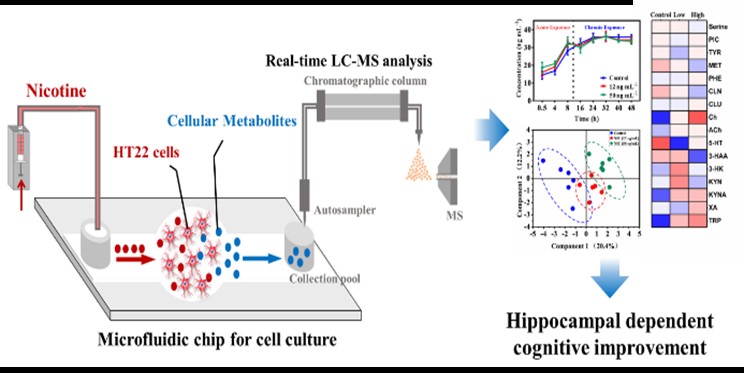Researchers Reveal the Mechanism of Nicotine on Hippocampal Dependent Cognition
Date:26-10-2021 | 【Print】 【close】
Nicotine ingested from smoking exerts neuroprotection and developmental neurotoxicity in central nervous system. It can produce several changes of cognitive behaviors through regulating the release of different neurotransmitters in the brain.
However, the effects of nicotine exposure or withdrawal on neurotransmitter metabolism of hippocampal neuron are still unclear, and it is difficult for conventional analytical methodologies to simultaneously measurement all neurotransmitters in real-time.
Dr. LUO Qian’s group from the Shenzhen Institute of Advanced Technology (SIAT) of the Chinese Academy of Sciences reported that the dynamic alterations in neurotransmitters metabolism of mice hippocampal neuron (HT22) cells induced by nicotine exposure and withdrawal by using a microfluidic chip-coupled with liquid chromatography-mass spectrometry (MC-LC-MS) system in real-time, which revealed the possible mechanism of nicotine on hippocampal dependent cognition.
Their study was published in Chinese Chemical Letters on Sept. 24.
In this study, researchers real-time evaluated the dynamic alterations in neurotransmitters metabolism of HT22 cells induced by nicotine exposure and withdrawal at relevant exposure levels of smoking and secondhand smoke by using a MC-LC-MS system. The MC-LC-MS system used in present study showed a greater advantage to detect unstable metabolites than conventional method by using in vitro model, and they found HT22 cells mainly released related neurotransmitters of tryptophan and choline metabolism. Moreover, exposure to nicotine at relevant levels of smoking and secondhand smoke significantly altered the metabolism and secretion of serotonin, kynurenic acid, choline and acetylcholine of HT22 cells, and their alterations was closely associated with the exposure dose and duration.

Fig. A real-time study on dynamic alterations in neurotransmitters metabolism of HT22 cells induced by nicotine exposure and withdrawal by using MC-LC-MS systems. (Image by SIAT)
These results suggested the acute exposure to nicotine was beneficial to protect the neurons, especially cognitive enhancement, and the elevated picolinic acid continually protected neuronal cognitive function after nicotine withdrawal. Furthermore, the dynamic alterations of neurotransmitter metabolism induced by nicotine might be a possible protective mechanisms of nicotine on hippocampal dependent cognition.
Media Contact:
ZHANG Xiaomin
Email:xm.zhang@siat.ac.cn